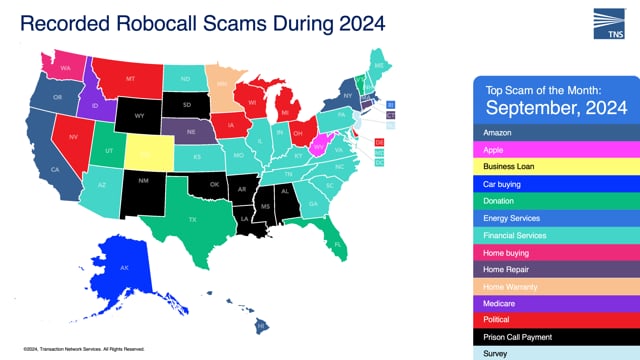Trending 2024 US Presidential Election Scam Calls╠²
As we near the 2024 Presidential election in the US, ─ó╣Į╩ėŲĄŌĆÖ Robocall Protection team are tracking an increase in unwanted political calls. While a jump in unwanted calls can be frustrating for subscribers, you might be surprised to learn that many of them are legal. Keep reading to find out how to detect a scam political call even if they are following the legal robocall guidelines.╠²╠²
What is Considered a Legal Political Call?╠²
Legitimate auto-dialed or pre-recorded political calls are allowed in certain circumstances. They are allowed to call landlines without prior consent but are limited to no more than three calls in a 30-day period, in which the called party can revoke consent at any time. Political parties are not allowed to auto-dial or send pre-recorded calls to mobile devices without consent. The caller must provide their name or entity name at the beginning of the message and their telephone number must be provided at either the beginning or end of the message. Calls can be reported to the FCC if they are not following these rules and itŌĆÖs important to note that text messages should also follow the same guidelines.╠²╠²
How to Identify a Political Scam Call?╠²
There are many scams that are common around election season. An easy one to spot is scammers pretending to be fundraising, where they may ask for a donation over the phone with the intention of pocketing the cash. If you wish to make monetary donations to a campaign, the best way to avoid being swindled by a scam is donating directly to a verified website of your candidate. Never give your card or bank information over the phone, especially to an unsolicited caller. As technology evolves, these scams can sound more believable. For example, fraudsters may use AI voice cloning technology to impersonate a candidateŌĆÖs voices. However, if they are asking for personal information over the phone, it could very likely be a scam.╠²╠²
Voting scams are also common and often have two main intentions ŌĆō to gain personal information or attempt to keep people away from the polls to avoid votes for their opponent. A scammer may call and claim you can vote over the phone, when doing so they may collect personal information such as your address and SSN. In the US, you cannot vote over the phone, so this is an immediate red flag. Other voting scams often involve spreading potential misinformation, again to keep voters away from the polls. For example, fraudsters may call to recommend voting the day after the election to avoid long polling lines. This is misinformation and a form of voter suppression. To avoid falling victim to a voting scam, you can check where and when you can vote (including how to vote early) with your state department of elections.╠²╠²
It is best practice to never engage with unknown numbers and report phone numbers being used by scammers to your carrier. If you believe you are the victim of a scam, you can report it to your local police, state Attorney GeneralŌĆÖs office and theŌĆ».ŌĆ»ŌČ─»╠²
Call-blocking apps, including those poweredŌĆ»byŌĆ»─ó╣Į╩ėŲĄ Call Guardian┬«, are also a great resource for reporting and blocking unwanted robocalls. Stay vigilant and share information about scams with others.ŌĆ»ŌČ─»╠²
Call Guardian is a registered trademark of Transaction Network Services, Inc.╠²
Ready to Learn More?
Discover more about how ─ó╣Į╩ėŲĄ robocall protection services help your subscribers and expand your network.
Robocall Heatmap
Discover which scams are most prominent across the US in our nationwide heatmap that plots the state-by-state picture of scams on a monthly basis throughout 2024.

Unwanted Calls Nationwide Snapshot
─ó╣Į╩ėŲĄ estimates that more than 66 billion unwanted calls were made in the last 12 months representing a 6% decrease over the last 12 months versus the previous 12 months.╠² Unwanted calls decreased 9% from August to September at 7.1B. This represents a 45% increase from September 2023 to September 2024.
Unwanted calls are comprised of nuisance calls and high-risk calls. The severity of harm of nuisance calls are moderate. The severity of harm for high-risk calls is deemed as a major invasion of privacy that can cause emotional distress.

─ó╣Į╩ėŲĄ Heatmap of Originating Unwanted Calls
Top 10 Area Codes for Generating Unwanted Calls – September 2024 |
Top 10 Area Codes for Generating Unwanted Calls – August 2024 |
Top 10 Area Codes for Generating Unwanted Calls – September 2023 |
||||||||||||||||||||||||||||||||||||||||||||||||||||||||||||||||||||||||||||||||||||||||||||||||||||||||||||||||||||||||||||||||||||
|
|
|
─ó╣Į╩ėŲĄ Unwanted Call Indices
─ó╣Į╩ėŲĄ Calling Trust Index – Last 12 Months |
─ó╣Į╩ėŲĄ Complaint Index – Last 12 Months |
|
The ─ó╣Į╩ėŲĄ Calling Trust Index is a measure of the crowd-source feedback for the unwanted calls that ─ó╣Į╩ėŲĄ receives in relation to the total number of calls to a subscriber. The index gives an indication of the consumer trust in voice calling and pulls data from our robocall protection platform ─ó╣Į╩ėŲĄ Call Guardian┬«. |
─ó╣Į╩ėŲĄ Complaint Index is a measure of the FCC complaints for the Do-Not-Call List in relation to the total number of unwanted calls seen by ─ó╣Į╩ėŲĄ. The index gives an indication to how many consumers are reporting complaints to the FCC relative to the number of unwanted robocalls they receive. |
Take Action for Robocall Protection, go to: ReportARobocall.com
─ó╣Į╩ėŲĄ Call Guardian uses real-time call events combined with crowd-sourced data to create accurate and comprehensive reputation profiles differentiating legitimate users from abusive, fraudulent and unlawful ones. Reporting robocall incidents adds important data making our solutions more robust.

Contact Us
Contact ─ó╣Į╩ėŲĄ to learn more about how our robocall protection services enhance your reputation and expand your business.
─ó╣Į╩ėŲĄ Robocall Investigation Report Mailing List
Request to be added to the ─ó╣Į╩ėŲĄ Robocall Investigation Report mailing list today.



















































































